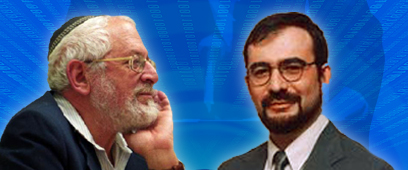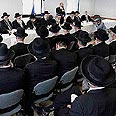

Path to Judaism paved with obstacles and tests
Nearly 300,000 immigrants are considered non-Jews according to Jewish law. In Russia they suffered from anti-Semitism and in Israel they can't marry. Is Orthodox conversion the only way to become Jewish? Reform and Orthodox rabbis present the alternatives
Rabbi Gregory Kotler: 300,000 new immigrants are being abandoned
About one million new immigrants arrived in Israel from the former USSR over the past two decades. It is currently the Jewish population's largest ethnic group in Israel. The number of "mixed marriages" among Russian Jews reached some 80 percent in recent years. Questions such as "who is a Jew," and "who is a convert" are even more potent among this community. In the eyes of observant Jews – and as a result also in the eyes of the State – a family of new immigrants from the former USSR comprising a Jewish father, a non-Jewish mother and two children – is perceived as a family that is 75 percent non-Jewish.
This is not so according to the average Russian Jew. The children, and often the woman in such families, suffered from acts of anti-Semitism in Russia, encountered difficulties in enrolling in universities and couldn't find appropriate employment. Many partook in the struggle to make aliyah. Many viewed themselves as Jews until arriving in Israel. It is the State of Israel that forces a vague identity on these people.
Jewish immigrants are undergoing a deep identity crisis. This crisis is also accompanied by real discrimination – they are not legally permitted to marry in Israel, they encounter problems regarding their personal status, and finally they are buried behind the fence. Isn't Israeli society obligated to help them?
The chief rabbinate has monopolized all the religious services, including matters of conversion. The rabbinic courts make life difficult for anyone wishing to convert. The demands made on Jewish couples, the obligation to enroll children in religious educational institutions only and the harsh halachic way of life they are forced to adopt – does not allow the majority of immigrants to convert and to become Jews in the State of Israel.
The Law of Return does not grant the right of aliyah to a Jew who converted to Christianity. Yet following aliyah, everything is open – in present-day Israel it is easier to convert to Christianity than it is to convert to Judaism. And this is just one of the social responses developing in face of the rejections by religious institutions. There are also cases where immigrants become "enclosed" within "Russian ghettos," developing hatred towards the State and anti-Semitism (including anti-Semitic graffiti in Russian), migration to anywhere at every opportunity. Hence, the State of Israel and the people of Israel are losing masses of young people who are willing to become part of the Jewish State.
Close to 300,000 immigrants, Israeli citizens, are not deemed Jewish according to Jewish religious law. According to official figures, just over 2,000 persons undergo Orthodox conversion in Israel every year. At such a pace, in order to convert all the non-Jews living amongst us today, we would require at least 100 years. In face of the constant search for God, experienced by many Russians following the collapse of atheist communism, rabbis shouldn't be surprised when they see churches opening up in Ariel and Ashdod.
In the social reality of ancient times and the Middle Ages, the ban on intermarriage worked for Jewish and non-Jewish sides alike, and thus the Jewish community could conduct itself according to Jewish religious laws that stipulate a strict conversion process. Today, however, this prohibition is no longer practical: Intermarriage has become commonplace not just among the Jews of the Diaspora, but also in Israel. Moreover: The majority of Jews (and non-Jews alike) regard this form of marriage as legitimate. Under such circumstances we must reach a broad consensus regarding conversion rules in Israel, so that it becomes accessible to any family member who views himself as part of the Jewish people.
While the number of Jews worldwide is dropping due to intermarriage, the only way to prevent the disappearance of the Jewish community is to assist the offspring of these marriages to become part of Israeli society. And here, in the State of Israel, this is the only way to help thousands of civilians, who are willing to die for the sake of the country – but are not permitted to marry in it. The modern denominations of Judaism are open to this dialog and are supporting the courageous Orthodox rabbis who would rise up to this national challenge for the benefit of Israeli society as a whole.
Rabbi Yisrael Rosen: There is no other way into the prestigious club
The Bible depicts two types of converts: Jethro, Moses' father-in-law, and Ruth. The former depicts a convert who does so out of fear of God, after hearing, all the way in Midian, about the Revelation at Mount Sinai, when God gave the Israelites the Ten Commandments. Ruth, from the Book of Ruth, is the family convert. She is the one who discovers her identity, "thy people shall be my people, and thy God my God," through her commitment to her Jewish mother-in-law and her dream of meeting her future husband in the fields of Bethlehem.
The model of Ruth returning from the fields of Moab is a national challenge which is now being placed on the doorstep of Israeli Jewish society. Tens of thousands of gentiles have returned here from the Diaspora on the wings of the Law of Return, and we are obliged to open up friendly conversion doors.
In the courtyards of the special courts for conversion, available throughout the country, we encounter thousands of "Ruths" every year (some 2,000 converts a year and an additional 2,500 converts from among Ethiopian immigrants whose conversion procedure is included in the Jewish Agency absorption process); the vast majority are fertile women. We, the rabbinical judges charged with the conversion process, shed a tear hundreds of times every year, when a Ruth from Ukraine, Budapest, South Africa, or Sao Paulo stands before us, and after 10 months of ulpan study (twice a week in the afternoons) she announces she will do as instructed (Na'ase Ve'nishma) just like on Mount Sinai. The intensity of the experience felt by the conversion rabbinical judges primarily stems from the personal stories, but also from the envy for being able to decide for themselves to join the Jewish people and its fate, unlike ourselves – who were born into it without being asked.
Further tears are shed when the "Jewish side of the family," the authentic Jewish spouse, returns or comes closer to traditional Jewish life thanks to "Ruth." This common occurrence accompanies the challenge of converts in 2007 and multiplies the extent of conversion to dimensions larger than they were in the days of Moses.
Indeed, this is Orthodox conversion. There is no other way to access the prestigious club. The Jewish people, who received the Ten Commandments at Mount Sinai where they were defined as a people, are prepared to open its gates to gentiles and share its Torah and fate. The only condition is: To experience a personal "Revelation at Sinai." Moreover, the sages of blessed memory taught us that the souls of generations of converts retroactively experienced that awe-inspiring occasion. We only have to reconstruct it… Non-religious converts, even if their conversions were performed by Jewish organizations, will not adapt, will not become acclimatized, and will lead to a future trail of separations and tragedies.
The conversion process includes recognizing Jewish life alongside Bible stories and history; experiencing the cycle of Jewish life; maintaining ties with the community - often with a warm adoptive family. These result in our actively writing a continuous Book of Ruth; an ongoing chain, which is expecting additional links, hundreds of thousands of Ruths who will join it. There is conversion in Israel – a friendly and halachic conversion.
Rabbi Kotler is the coordinator of the (Reform) Progressive Rabbis' Council in Israel
Rabbi Rosen is a rabbinical court conversion rabbi















